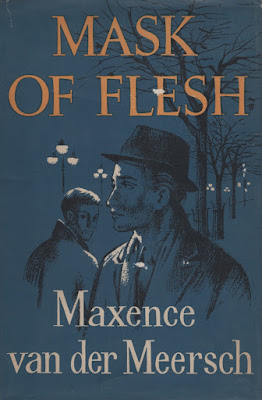 |
| London : William Kimber, 1960 Translated from the French by Mervyn Savill |
Emmanuel Ghelens, born in the years before WWI, obsesses over the effect of having had the prototypical controlling, 'masculine' mother has had on his life. During the war, his parents send him to boarding school. He describes his introduction to sex and his desire to create a lasting bond with the other boys. For them, it was simply physical. At the age of 18, he was picked up by an older man in Antwerp. Although he describes being disgusted with himself after the experience, he also began to make the connection in his own mind of his behavior and that of female prostitutes. They also (unwittingly) are searching for a little tenderness ... each time surrendering a little piece of their heart.
He soon begins to describe himself as a depraved monster or as having a monster living inside him. "It had made me a prisoner, a slave of the flesh." (p.39) After consulting a priest who told him that he was damned, he decides to live in solitude to avoid corruption. He knows that he will be open to robbery and blackmail if he doesn't.
A short time later, he meets Seddik, an Algerian man who had turned to prostitution in order to survive. Seddik was really looking for a friend and had found one in Emmanuel. While traveling, Emmanuel falls ill and when he is finally able to return, Seddik has disappeared. This is a huge loss for Emmanuel. Seddik was a prospect for hope and possible redemption. He had found love ... and had now lost it. He was now a prisoner again.
For a digitized archival collection of material related to the author (including correspondence regarding the manuscript for Masque de Chair), visit Archives de Maxence van der Meersch at Bibliothèque Numérique de Roubaix (in French).
Bibliographies & Ratings: Young (2641*)
No comments:
Post a Comment